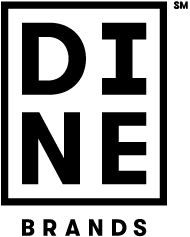
United States
Securities and Exchange Commission
Washington, DC 20549
Notice of Exempt Solicitation
| 1. | Name of Registrant: |
DINE BRANDS GLOBAL, INC.
| 2. | Name of person relying on exemption: |
the humane society of the united states
| 3. | Address of person relying on exemption: |
1255 23rd St NW, Suite 450
Washington, DC 20037
| 4. | Written materials: |
The attached written materials are submitted pursuant to a voluntary application of Rule 14a-6(g)(1) promulgated under the Securities Exchange Act of 1934. Submission is not required of this filer under the terms of the Rule but is made in the interest of public disclosure and consideration of these important issues.

April 6, 2022
Dear fellow Dine Brands shareholders,
This filing responds to Dine Brands Board of Directors’ deeply flawed statement opposing the Humane Society of the United States’ 2022 shareholder proposal. As we’ll show, the opposition statement utilizes misdirection to make illogical arguments. Indeed, the opposition statement actually affirms the importance of voting in the proposal’s favor—and we believe shareholders will agree after reading this brief letter.
First, we’ll note that the opposition statement is essentially a list of explanations attempting to justify Dine Brands’ failure to keep its ESG pledge about eliminating cruel, solitary-confinement gestation crates from its pork supply. We’ll also note that Dine Brands had seven years to implement and assess its progress on that pledge. Not only did it fail to do so, but during that time, it never once reported to shareholders that it was having trouble meeting the commitment and continually communicated the commitment to shareholders on its website, as if everything was on track.
In fact, the Company’s statement implies it became aware it wouldn’t meet its gestation crate pledge prior to 2020, when it decided to “reevaluate” its commitment. Yet even in 2020, Dine Brands did not explain to shareholders there was a problem; it simply quietly deleted the 2013 ESG pledge from its website (and also deleted from its news archives the 2013 press release announcing it). And even now the Company’s statement fails to make clear that its new “group housing” commitment permits pigs to be kept in solitary confinement crates for nearly 40% of their pregnancies. This is hardly an exemplar of complete and accurate ESG communications.
Be that as it may, the opposition statement does succeed at one thing: confirming the shareholder proposal’s statements that Dine Brands did indeed fail to meet this longstanding animal welfare commitment.
But the proposal merely uses the example of that specific failed policy to illustrate a potentially wide gap between the company’s stated ESG commitments and the practices in its supply chain. As the proposal points out: Dine Brands’ failure to keep its gestation crate pledge (regardless of how it may justify that failure) is at odds with the company’s current ESG policy. That policy still claims Dine Brands is “committed” to a principle called the Five Freedoms of animal welfare. But that claim becomes meaningless, even detrimental to Dine Brands and its ESG claims, if the Freedoms are not actually required. And the opposition statement makes clear they aren’t, since by the company’s own admission it now allows its suppliers to confine pigs in a way which dramatically contravenes those Freedoms.
And since Dine Brands’ choice to now allow gestation crates simply cannot coexist with its current ESG language about the Five Freedoms, there’s a clear and obvious gap in the company’s ESG commitments versus the reality of its supply chain. Thus, consistent with the example noted above, the veracity of its other ESG claims is brought into question in quite a significant way.
With that in mind, the proposal’s “Resolved” clause doesn’t even mention the phrase “gestation crates.” Rather, focusing on accurate and complete ESG communications, it asks more broadly for “an analysis of the specific ways in which Dine Brands reconciles disparities” between its stated ESG standards and the “implementation of those standards.” As well, it asks for “the success rate” of suppliers following its ESG standards and “specific actions that have been taken to address failures.”
With this in mind, we urge you to vote FOR the proposal. Thanks, and feel free to connect if you have questions.
Kind regards,

Matthew Prescott, Senior Director of Food and Agriculture
(240) 620-4432, mprescott@humanesociety.org
Please note: The Humane Society of the United States is not asking for and cannot accept your proxy card. Please vote FOR the shareholder proposal on the proxy received from the management, following the instructions enclosed with the proxy as to how to cast your ballot.